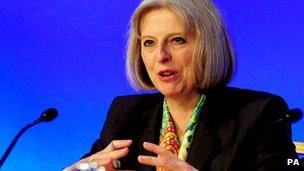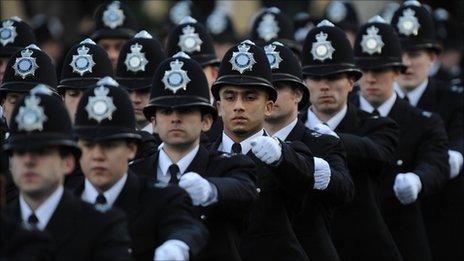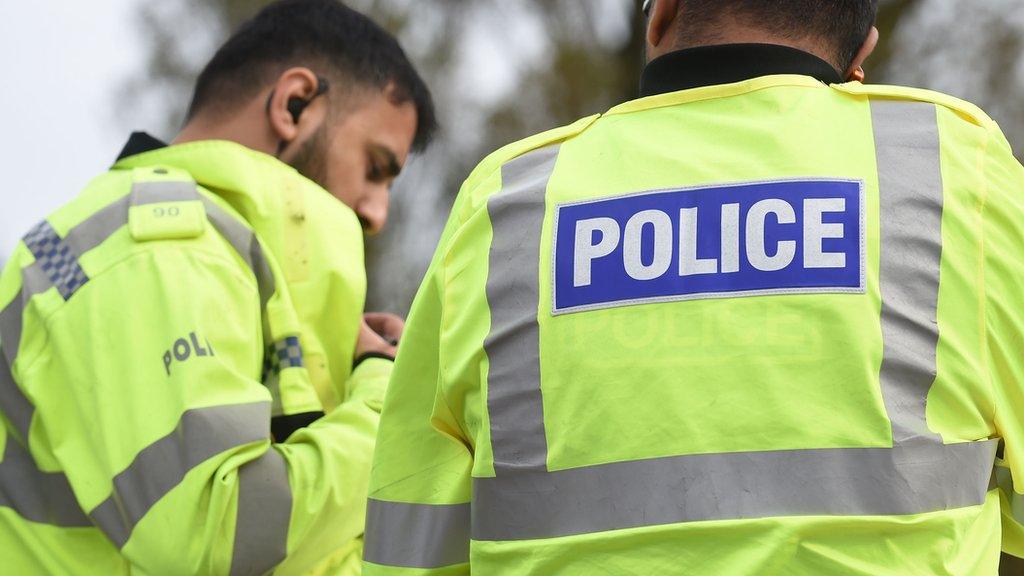Police recruitment changes planned, May says
- Published

Theresa May said the consultation into direct entry will begin in the autumn
Ministers are drawing up plans for some senior police officers in England and Wales to be directly recruited from outside the service, Theresa May says.
The home secretary told a conference of senior police officers the move would bring "greater diversity" to forces.
She said she would hold a consultation on so-called direct entry - one of several recommendations from a major review into police pay and conditions.
But critics among superintendents said the policy posed an "operational risk".
Direct entry is intended to open up recruitment to senior policing posts to the wider public and business sectors, rather than promoting only officers who have completed their training and worked their way up the ranks.
Speaking at the annual conference of the Police Superintendents' Association of England and Wales (PSAEW), Mrs May said direct entry was "not just about more women police leaders or more senior officers from ethnic minorities".
"It's about those who have gained broader experience and new perspective in fields like the wider public sector and business," she said.
When the home secretary appeared in front of Police Federation members at a conference four months ago she was booed and heckled by officers in the audience.
BBC home affairs correspondent Danny Shaw said, despite the obvious opposition to the plans, Mrs May was listened to respectfully and applauded at the end of her speech.
But PSAEW president Derek Barnett said the idea, which he claimed would cost hundreds of thousands of pounds to implement, would not "bring any significant benefits" to police forces.
He said of the 43 police forces in England and Wales, only the Metropolitan Police would have the "capacity to cope" with implementing the policy.
Cancelled leave
Mr Barnett also warned of an erosion of goodwill between police officers and the government, after government cuts to police budgets prompting a reduction in numbers of police and civilian staff.
He said goodwill encompassed situations where "police officers are recalled to duty and work additional long hours often without claiming reward, readily accept last-minute changes to shifts to fill the gaps on the street, cancelled leave and days off".
He warned: "If we lose the tradition of goodwill built up over many years it will be hard to recover it."
The government consultation into the effect of the policy will be launched in the autumn.
At Tuesday's conference, Mrs May also faced questions from police officers in the audience concerned about the forthcoming elections for police and crime commissioner (PCCs) in England and Wales.
Thirty-seven PCCs in England and four in Wales are due to be elected in November. They will have the power to scrutinise their force, set budgets and hire and fire the chief constable.
The home secretary said "there is still a job to be done" to communicate to the public what the PCC role would entail.
"I was on the streets last Saturday actually talking to some individuals in Staffordshire about the issue... and I found that the response was that when it was explained to people, people thought it was interesting and wanted to know more about it.
"There will be some work being done by the Home Office in regards to that... just about what the role is and what the elections are about.
She added that the Electoral Commission would be helping to "raise the awareness of the issue and the role".
- Published13 September 2011
- Published20 July 2011

- Published21 April 2016
